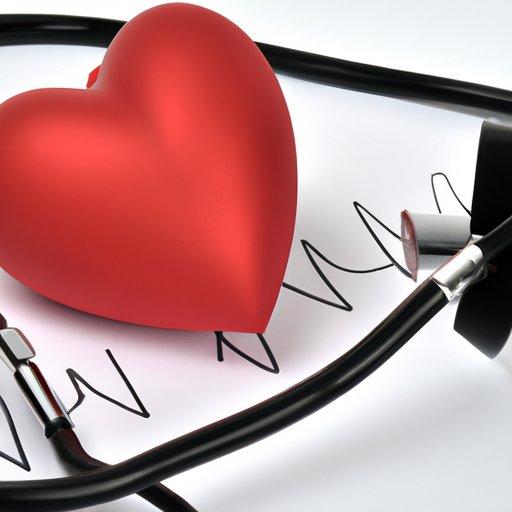
Is Hypertension a Cardiovascular Disease?
High blood pressure, also known as hypertension, is a common health problem affecting millions of people worldwide. While it doesn’t typically cause noticeable symptoms, hypertension can have serious long-term consequences, including an increased risk of cardiovascular diseases. In this article, we explore the links between hypertension and cardiovascular disease, examine its risks and dangers, and provide suggestions for improving heart health.
Exploring the Link Between Hypertension and Cardiovascular Disease: What You Need to Know
Hypertension and cardiovascular disease are closely linked. In fact, high blood pressure is a known risk factor for heart disease, heart attack, and stroke. When left untreated, hypertension can cause significant damage to the heart, arteries, and other organs. The good news is that there are effective ways to manage hypertension and reduce the risk of cardiovascular disease.
Research has shown that controlling hypertension can lower the risk of heart disease and stroke. The American Heart Association recommends that individuals with hypertension maintain a systolic blood pressure of less than 130 mmHg and a diastolic blood pressure of less than 80 mmHg. This can be achieved through a combination of medication, lifestyle changes, and other interventions.
The Hidden Dangers of High Blood Pressure: How Hypertension Damages Your Heart
High blood pressure exerts excessive force on the walls of the arteries, which over time can cause damage to the heart, kidneys, and other organs. The extra strain and damage to the arteries make it harder for the heart to pump blood throughout the body, which can lead to heart disease and other cardiovascular conditions. Hypertension can also lead to the development of blood clots, which can result in heart attacks and strokes.
In addition, high blood pressure places individuals at an increased risk of developing other cardiovascular conditions such as coronary artery disease, heart failure, and arrhythmias.
Beyond Medication: Lifestyle Changes to Control Hypertension and Reduce Cardiovascular Risk
While medications can be effective in treating hypertension, there are several lifestyle changes that can help manage hypertension and reduce the risk of cardiovascular disease. For instance, reducing salt intake, increasing physical activity, and maintaining a healthy weight are all recommended changes for individuals with hypertension. A diet that is low in saturated fats and high in fruits, vegetables, and whole grains can help reduce blood pressure levels. Exercise can reduce blood pressure by strengthening the heart and improving circulation. Lifestyle changes can also help reduce stress levels, which can be a contributing factor in hypertension.
Hypertension vs. Cardiovascular Disease: What’s the Difference?
Hypertension is a condition characterized by high blood pressure levels, whereas cardiovascular disease refers to a group of conditions that affect the heart and blood vessels. While hypertension is a risk factor for cardiovascular disease, not all individuals with hypertension will develop cardiovascular disease. Cardiovascular diseases include atherosclerosis, heart failure, coronary artery disease, and many others. Symptoms of cardiovascular disease can range from chest pain and shortness of breath to fatigue, dizziness, and fainting.
Debunking Common Myths About Hypertension and Cardiovascular Disease
There are several misconceptions surrounding hypertension and cardiovascular disease that need to be clarified. One common myth is that hypertension only affects older adults. In reality, hypertension can occur at any age and can affect individuals of all races and genders. Another myth is that hypertension is caused by stress alone. While stress can be a contributing factor in hypertension, there are other factors such as genetics, age, and lifestyle habits that can influence blood pressure levels.
Conclusion
Hypertension is a significant risk factor for cardiovascular disease, but it is also a manageable condition. Making lifestyle changes, taking medication, and adhering to medical treatment can all help manage hypertension and reduce the risk of cardiovascular disease. By educating ourselves about hypertension and cardiovascular health, we can make informed decisions about our health and improve our overall well-being.





